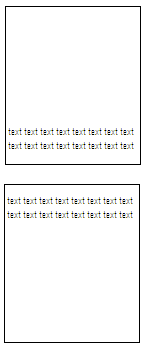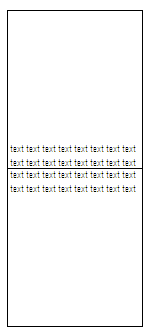doNotDisplayPageBoundaries (Do Not Display Visual Boundary For Header/Footer or Between Pages)
This element specifies whether applications displaying this document should display the contents of the header and footer when displaying the document in print layout view (§2.15.1.93) or should collapse those areas as well as the whitespace on all displayed pages so that the text extents are directly following one another. [Rationale: Collapsing the ends of pages makes it easier to read the contents of the document, since the text flows between pages without whitespace, while maintaining the WYSIWYG functionality of print layout view for the document's main content. end rationale]
If this element is omitted, then all pages should be shown at their full size (including whitespace and headers/footers) when they are displayed in print layout view.
[Example: Consider the images below illustrating two pages in a WordprocessingML document:

If document shall automatically have whitespace between pages removed when it is displayed, that requirement would be specified using the following WordprocessingML in the document settings:
<w:doNotDisplayPageBoundaries w:val="true" />
The resulting output might look like the following:

The doNotDisplayPageBoundaries element has its val attribute equal to true, therefore the document is automatically displayed with whitespace between text extents on following pages compressed, allowing the pages to be viewed more easily. end example]
|
Parent Elements |
|
settings (§2.15.1.78) |
|
Attributes |
Description |
|
val (On/Off Value) |
Specifies a binary value for the property defined by the parent XML element.
A value of on, 1, or true specifies that the property shall be explicitly applied. This is the default value for this attribute, and is implied when the parent element is present, but this attribute is omitted.
A value of off, 0, or false specifies that the property shall be explicitly turned off.
[Example: For example, consider the following on/off property:
<w:… w:val="off"/>
The val attribute explicitly declares that the property is turned off. end example]
The possible values for this attribute are defined by the ST_OnOff simple type (§2.18.67). |
The following XML Schema fragment defines the contents of this element:
<complexType name="CT_OnOff">
<attribute name="val" type="ST_OnOff"/>
</complexType>